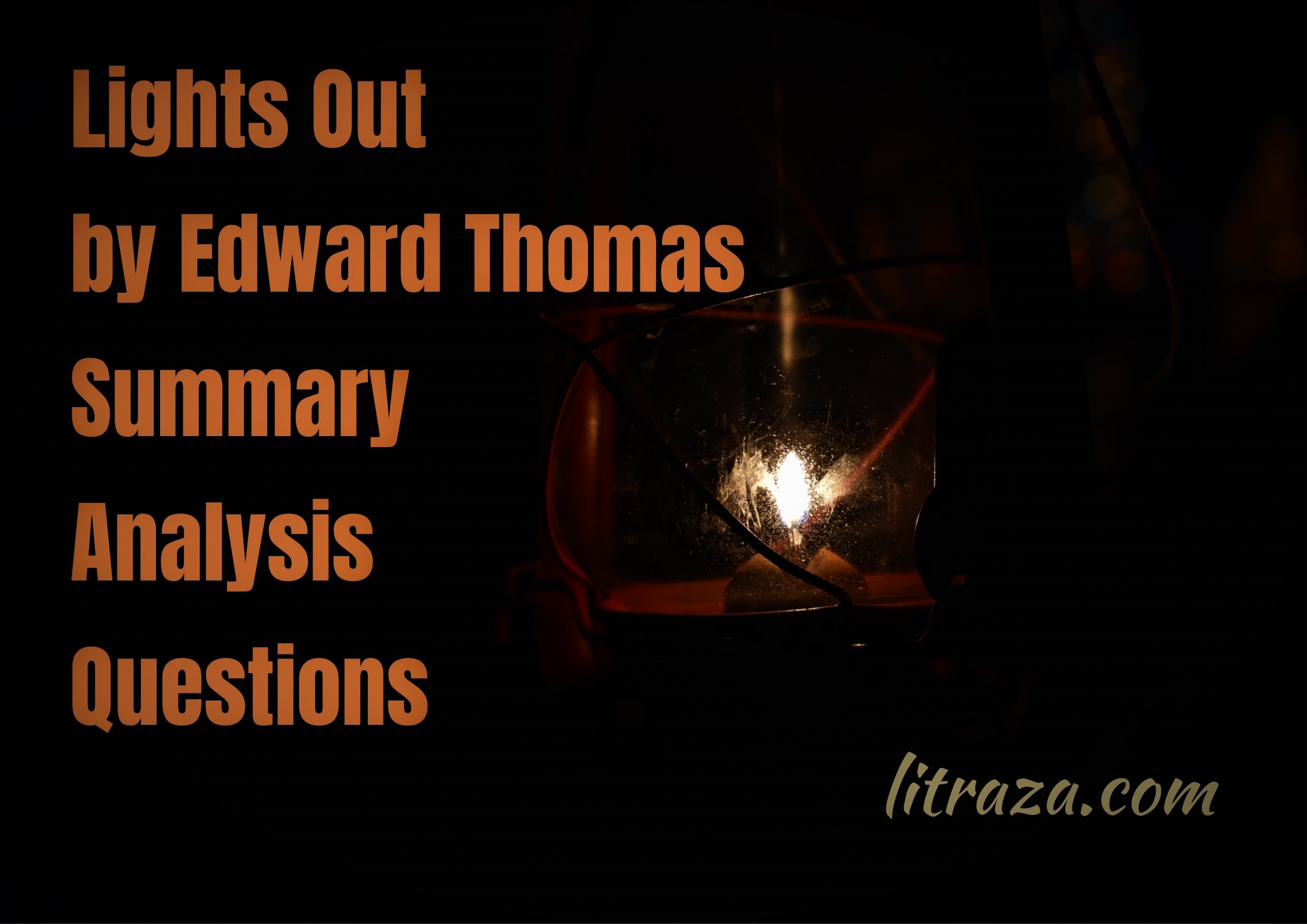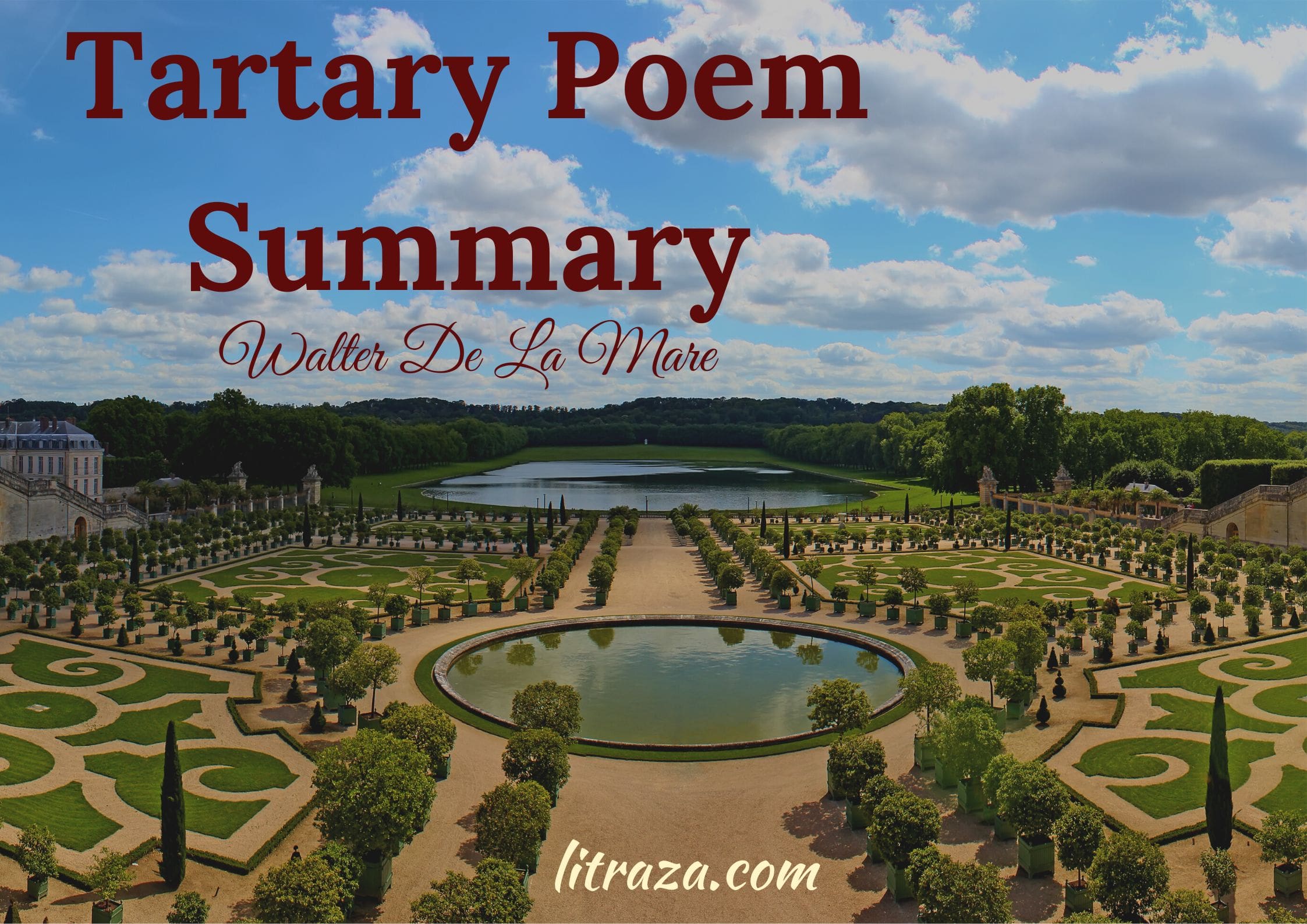Introduction
Lights Out by Edward Thomas is an expression of the impact of sleep. As an instinct, sleep has command over man. Edward Thomas tells us how strong this command is. He is of the view that man has to submit to the power of sleep. The poet compares sleep to an unmeasurable jungle full of tortuous paths. Because of its impressive imagery, Lights Out by Edward Thomas makes part of the English literature syllabi of various universities. This article, Lights Out by Edward Thomas – Summary Analysis Questions, is an attempt to enhance the comprehensibility of the poem. It contains a brief biography of the poet, a summary, and questions based on an analysis of the poem. This article will benefit both teachers and students looking for quality material about this poem. The students will obtain good grades while the teachers will get reliable leads for instruction.
Edward Thomas – A Brief Biography
Edward Thomas was born in Lambeth, Surrey, England on March 3, 1878. He was an accomplished poet, novelist, essayist, critic, and biographer. Some of the great names like Walter de la Mare, Aldous Huxley, and Seamus Heaney had great praise for his works. He had a close association with the American poet, Robert Frost. Thomas started poetry after having established his name as a critic. Like other Georgians, his poetry reflects the love of nature and beauty. Also, he makes use of archaic diction which is another characteristic of Georgian poetry. However, his ability to intensify the subject through a visionary approach distinguishes him from his contemporaries. Since he fought in the Great War, critics generally refer to him as a war poet. But very few of his poems share his war experiences directly. He embraced martyrdom in the Battle of Arras in France on April 9, 1917.
Text of the Poem Lights Out by Edward Thomas

Summary of the Poem Lights Out by Edward Thomas
Introduction
Lights Out by Edward Thomas deals with the idea of the power of sleep. The poet believes that like other instinctive needs, sleep has the power to control man. Sleep has deceptive characteristics. Once it begins to cast its impact on a person, he starts losing interest in other affairs of life. He is as helpless before sleep as before death. With every passing moment, the impact of sleep continues to grow stronger and one has to submit to its power and control.
Comparison of Sleep with a Deep Forest
Edward Thomas compares sleep to an unmeasurable deep forest. The poet says that he has come to the boundary of this forest. This forest invites all human beings to enter and lose themselves. They do not know whether the path in the forest is straight or tortuous. But they have to enter this forest sooner or later. They cannot exercise their will and have to bow before the influence of sleep.
Deceptiveness of Sleep
Edward Thomas says that way to this forest consists of many tracks. It beguiles human beings right from daybreak. It is the time when they get up and think that they have had their full sleep. But it is a misconception on their part. Whichever path they take ends at the edge of the forest of sleep. Suddenly, their sight begins to blur. It is a sign of the impact of sleep. They feel powerless before sleep and sink into the forest of sleep.
The Power of Sleep on Human Emotions
Edward Thomas believes that sleep is so powerful that it can dominate all human emotions. Love, despair, ambition, pleasure, and pain lose their importance before sleep. It does not matter whether an emotion is sweet or bitter, it cannot be stronger than sleep. Sleep overpowers all emotions. It seems nobler than all emotions.
Poet’s Desire to Enter the Forest of Sleep
Edward Thomas was a notable literary figure. To a literary figure, books have unusual importance. At the same time, a literary figure cannot resist the influence of beauty. But the poet would turn from any book or ignore the face of dearest look to enter the forest of sleep. He is not sure how it will happen. But he is ready to enter this state of unconsciousness alone.
Strengthening of the Influence of Sleep
Having entered the forest of sleep, Edward Thomas feels the strengthening of the influence of sleep. It is as if he were lying under tall trees and their foliage is heaping over him in layers. He listens to the silence of the forest of sleep and obeys it. It means that he is sound asleep.
Conclusion
Lights Out by Edward Thomas is an appropriate portrayal of the power of sleep. The poem depicts the condition of a man at the approach of sleep. The most important feature of the poem remains its imagery that suits the subject of the poem.
Important Questions
Q1: What is the significance of the title of the poem Lights Out by Edward Thomas?
Q2: How does the poem Lights Out by Edward Thomas express the power of sleep?
Introduction
Lights Out by Edward Thomas is a very interesting poem. In this poem, the poet presents his views about sleep which is an important aspect and instinctive need of living beings. He believes that sleep has such great power that we cannot compete with it. Our activities, desires, and ambitions cannot hold sleep. In other short, man is helpless before sleep.
Significance of the Title
Lights Out by Edward Thomas deals with the poet’s idea about sleep. It is of great importance to note that Edward Thomas composed this poem in 1917. At that time, he was serving in the British Army during World War I. The title of the poem, Lights Out, is a term that means the time of switching off lights in hostels and military barracks. So, it is evident that he wrote this poem under the influence of the time he spent on the war front. It is also very significant that Edward Thomas was killed on the war front in the same year. Therefore, some critics associate prophetic significance with the title. They believe that Edward Thomas has referred to death in the guise of sleep. He has shown man as helpless before sleep as he is before death.
Power of Sleep
In Lights Out, Edward Thomas uses the image of a deep forest to describe sleep. There are many paths in this forest. We cannot decide which way we should go. Once we reach the border of this forest, we feel inclined to lose ourselves in it. Sleep has a strange deceptiveness. It deceives us all day long. But as soon as the night approaches, we start feeling its impact.
The poet says that there is no sensation as powerful as sleep. It makes us ignore even the most precious emotions like love and ambition. We forget our despairs of the day. Our pleasure and pain become insignificant. We neglect even the dearest face we love to lose ourselves in the forest of sleep. It feels as if cloudy foliage were heaping itself upon us. We have to submit to the power of sleep.
Conclusion
Lights Out by Edward Thomas explores the power of sleep, the inevitability of death, and the uncertainty of life. It also shows man’s helplessness before instincts and the decree of fate. The diction employed by the poet is easy to comprehend. The tone of the words exhibits the poet’s sense of resignation before sleep or death.



[…] Apple-Picking by Robert Frost has a thematic similarity with Lights Out by Edward Thomas. The poem presents the impact of sleep on a farm owner who is busy picking apples. Like every […]